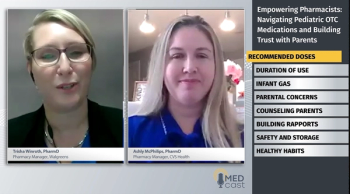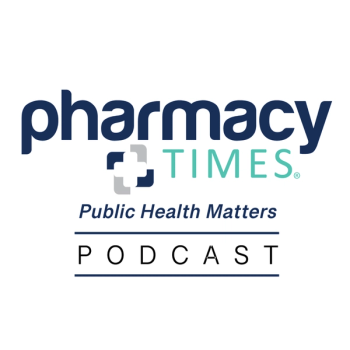
Steve Anderson, president and CEO of the National Association of Chain Drug Stores (NACDS), discusses memorable moments from this year's NACDS Total Store Expo.

Steve Anderson, president and CEO of the National Association of Chain Drug Stores (NACDS), discusses memorable moments from this year's NACDS Total Store Expo.

Sara Roszak discusses her role as president of the NACDS Foundation.

Scott Biggs and Doug Long explain current trends in the pharmaceutical industry and the importance of ensuring pharmacists are informed.

Jon Easter talks about community pharmacy's role in propelling diabetes innovation and optimizing patient care.

Rina Shah discusses the importance of community pharmacy and how pharmacists can optimize care for patients.

Craig Beavers discusses significance of the 2024 update to the 2020 ACC/AHA Clinical Performance and Quality Measures for Adults With Heart Failure.

The panel of experts examines the most recent ACIP recommendations for pneumococcal vaccination in adults aged 65 and older, highlighting key updates and changes to the guidelines.

Krista D. Capehart, PharmD, BCACP, FAPhA, Dr. Capeheart outlines the patient populations for whom pneumococcal vaccines are indicated and provides a detailed explanation of the ACIP-recommended immunization schedules for these vaccines.

Key opinion leaders provide pharmacists with essential guidance on the appropriate dosing and administration of over-the-counter medications for common pediatric conditions, while equipping them with strategies to effectively counsel parents on symptom identification, condition management, and when to seek medical advice for children's health issues.

A federal and state policy expert discusses the announcement from the Centers for Medicare & Medicaid Services on the agreement to lower prices for 10 selected drugs due to the Inflation Reduction Act.

Kelsea Seago, PharmD, discusses the crucial role of pharmacists in managing chimeric antigen receptor (CAR) T-cell therapy resistance.

Tune into this episode of “Public Health Matters” to learn about how Healthcare Advocate Summit, created by advocates for advocates, is involved in the discussion on improving access to health care.

Roszak highlighted pharmacy data interoperability and food is medicine programs as 2 examples of innovative projects at the National Association of Chain Drug Stores.

A clinical pharmacy specialist and specialty pharmacy manager from Allegheny Health Network urge patients to use their pharmacist in the treatment management of arthritis.

Dan Schrum discusses the integral role of pharmacy specialists in translating clinical trial results to clinical practice.

The pneumococcal vaccination experts offer a comparative analysis of the five FDA-approved pneumococcal vaccines, focusing on their structural differences and the specific strains each vaccine targets.

The panel of healthcare professionals examines how strategic vaccination can effectively mitigate pneumococcal outbreaks, thereby reducing exposure risks to vulnerable populations in healthcare settings such as nursing homes and hospitals.

Dan Schrum highlights the crucial role of lymphodepletion in enhancing the effectiveness of CAR T cell therapy.

Pharmacists can personalize supportive care, educate patients and their caregivers, advocate for patients, and collaborate with other health care workers.

Chris Peshek of Discount Drug Mart discusses the importance of community pharmacies and the process of building relationships with patients, and how a profession in the field can be rewarding for those seeking to pursue it.

In addition to a rapid deterioration, psychosis in Alzheimer disease can also lead to poorer quality of life, damaged patient-caregiver relationships, and increased isolation.

Edward B. Lee, MD, PhD, also describes how understanding Alzheimer disease requires the integration of multiple fields including genetics, pathology, epidemiology, pharmacology, and physiology.

A medical professional examines the significant patient burden imposed by pneumococcal infections, highlighting how this burden drove the development of innovative vaccine technologies.

Key opinion leaders identify high-risk populations for invasive pneumococcal disease, explain the underlying factors contributing to their increased susceptibility, and offer strategies to improve suboptimal vaccination rates, particularly among historically underserved communities.

Tara Spires-Jones, DPhil, FMedSci, discusses how oligomeric tau clumps inside brain synapses, pointing to indirect evidence that it may be progressing through the brain by jumping between connections.

The co-founder, chief science officer, and chairman at Longeveron discusses the findings from the phase 2a trial CLEARMIND, as well as next steps to developing the therapy Lomecel-B.

Tune into this episode of “Public Health Matters” to hear a discussion with Dr. Frank North centered around successful mentorship and advocacy for representation across minority groups in the pharmacy profession.

Tune into this episode of “Public Health Matters” to hear a discussion with Dr. Frank North centered around successful mentorship and advocacy for representation across minority groups in the pharmacy profession.

Joshua Hare describes how Lomecel-B addresses neuroinflammation, unlike other treatments which typically target amyloid disposition.

Cherokee Layson-Wolf, PharmD, BCACP, FAPhA, provides key takeaways and advice to pharmacists on the administration of RSV vaccines.